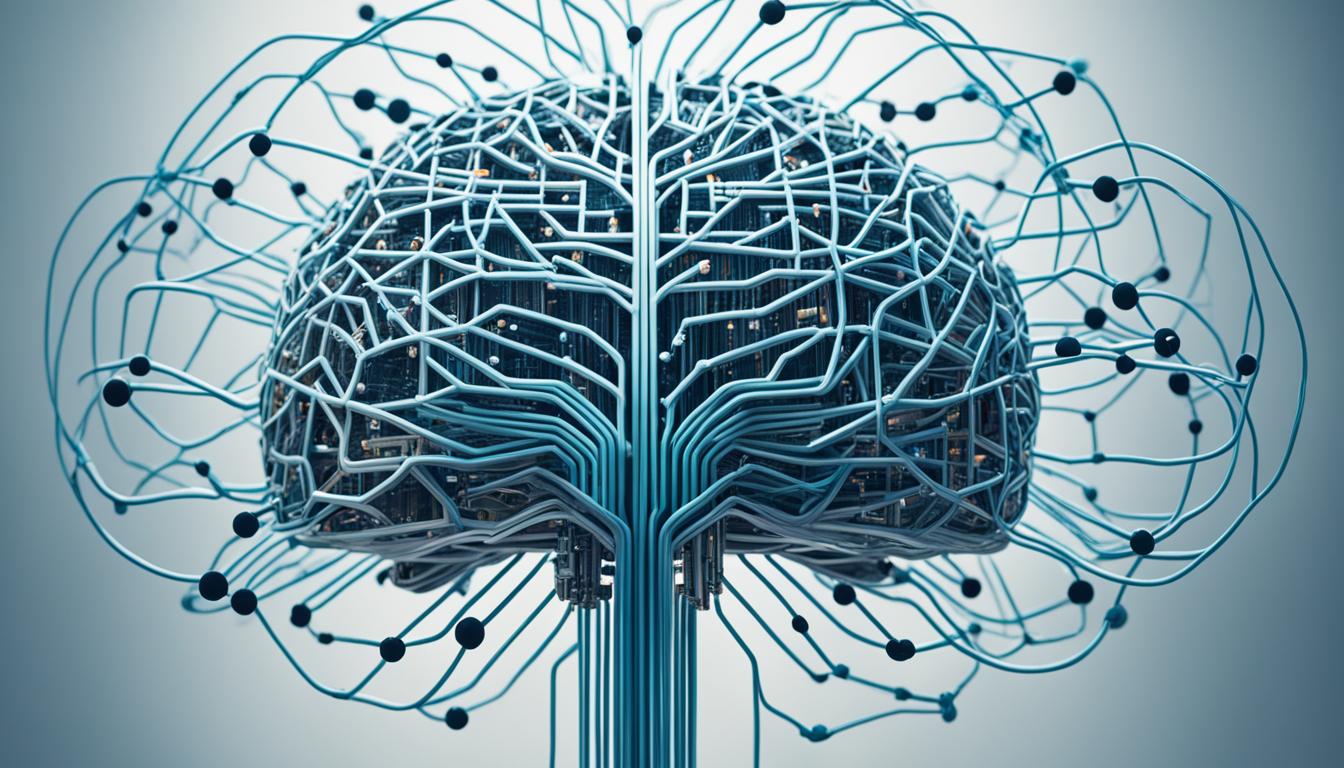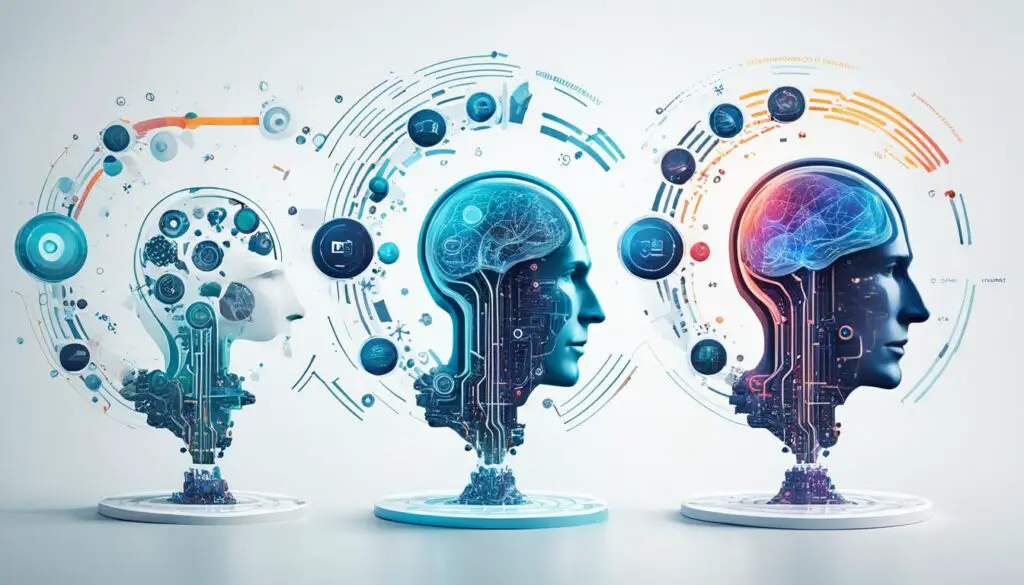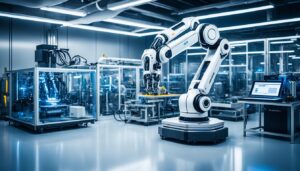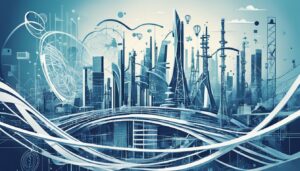
Artificial intelligence (AI) is changing the game. It’s making big moves in industries and guiding human progress. AI touches everything from big data, robotics, to the Internet of Things (IoT). Companies all over the world see its value. Many are already using AI or planning to soon.
AI development has been impressive. It began by outplaying chess masters. Now, it’s moved to creating smart AI models that can write relevant stuff. It’s also helping in healthcare and schools, making its impact even broader.
Looking forward, AI’s planning role is becoming more critical. It’s key to making business tasks simpler, like talking to customers or analyzing data. Yet, we must tackle some tough parts. These include the shake-up in jobs and keeping our data safe.
Key Takeaways:
- AI is revolutionizing industries and shaping the future of humanity.
- Enterprises are integrating AI into their operations to stay ahead.
- AI has evolved from defeating chess grandmasters to generating relevant content.
- Improved business automation and job disruption are key impacts of AI.
- Data privacy and regulation are significant concerns as AI develops.
The Evolution of AI
Since 1951, artificial intelligence (AI) has grown a lot. It’s thanks to advances in machine learning and deep learning. These have led AI to big wins in many areas.
In 1997, something huge happened. IBM’s Deep Blue beat chess genius Garry Kasparov. This event showed how AI can do better than humans at complex challenges.
Another big moment was in 2011. IBM Watson won on the game show Jeopardy!. Watson could understand how we talk and sort through tons of data. This showed AI’s strength in handling information and thinking.
AI has also made leaps in generative AI models. OpenAI’s GPT models are a good example. They create text, audio, images, and more. All of it feels real and related to the context.
AI’s growth has opened new doors in making content. Generative AI models, like OpenAI’s GPT, can mimic human writing. This starts a new phase of creativity and innovation powered by AI.
AI doesn’t just make content. It’s also in health care and speech studies. AI tools can look through lots of genetic info to help make vaccines. They’re also used in exploring how we understand speech, think, and generalize.
AI keeps getting better. It’s great at solving problems, making decisions, and analyzing data. Its skill in working with complex info and spotting trends will keep changing many fields and sparking new ideas.
AI Evolution Milestones:
- 1951: First documented success of AI
- 1997: IBM’s Deep Blue defeats chess grandmaster Garry Kasparov
- 2011: IBM Watson wins Jeopardy!
- Advancements in generative AI with models like OpenAI’s GPT algorithms
- AI applications in healthcare and speech modeling

| AI Evolution Timeline | Key Milestones |
|---|---|
| 1950s-1960s | Early AI research and development |
| 1980s-1990s | Expert systems and development of machine learning algorithms |
| 1990s-2000s | Rapid progress in machine learning and neural networks |
| 2010s-present | Breakthroughs in deep learning, generative AI, and AI applications in various industries |
How AI Will Impact the Future
AI’s growth is changing our future. In business automation, AI helps companies be more efficient. Automated systems can manage conversations with customers and look at data. This makes companies faster and gives employees time for more important work.
The downside is job disruption. Some jobs might be taken over by machines. This could mean fewer jobs in some fields. Yet, AI also creates new jobs, like in machine learning. These jobs let people learn new skills and help with AI systems.
Another big issue is data privacy with AI. Training AI uses a lot of data, which can raise privacy concerns. New rules are being made to keep personal data safe. Companies need to follow these rules to protect our information.
AI’s future effects don’t stop with job changes. It also impacts regulation. As AI gets more advanced, we need clear rules. These should cover ethics and how to use AI safely. Governments are working on this to make sure AI is used right.
Climate change is another area where AI can help. AI can look at climate data and help us make better choices. But AI also uses a lot of power, which affects the environment. We need to find a good balance to make the most out of AI.
In summary, AI has many effects on our future. It makes businesses better and helps with climate change. But it also brings challenges like job loss and privacy issues. With good rules and careful use, AI can lead to great things. It’s important to use AI wisely for a better future.
Current and Future Impacts of AI
Let’s explore AI’s potential impacts:
| Area | Impact |
|---|---|
| Business Automation | Improved efficiency, potential job disruption |
| Data Privacy | Concerns regarding personal data protection |
| Regulation | Increasing need for clear guidelines and ethical frameworks |
| Climate Change | Potential for accurate predictions and informed decision-making |

This table shows key impacts of AI. It’s key to think about these when using AI in various fields.
Conclusion
AI planning is set to change many industries in big ways. Markets like manufacturing, healthcare, finance, education, media, and customer service will see a lot of growth. But, using AI also means facing some tough challenges and risks.
One big worry about AI is that it might cause job losses. As machines and AI get better, some manual jobs could go away. But it’s key to remember that AI opens up new jobs too, especially in machine learning and AI tech.
Another issue is that AI can have human biases in its algorithms. We must work hard to fix these biases to make AI fair for everyone. Also, focusing on inclusivity, keeping data safe, and having the right expertise are important for AI planning.
The advantages of using AI for planning are huge though. It can make decision-making and planning much smarter and quicker. But, we have to use AI in a responsible and ethical way, always thinking about how it affects society.
FAQ
What is AI planning?
How does AI technology contribute to future developments?
What is the evolution of AI?
What impacts will AI have on the future?
What are the benefits and challenges of AI planning for future developments?
Source Links
- https://builtin.com/artificial-intelligence/artificial-intelligence-future
- https://www.linkedin.com/pulse/how-ai-change-planning-system-commonplace
- https://www.mdpi.com/2413-8851/7/3/70






